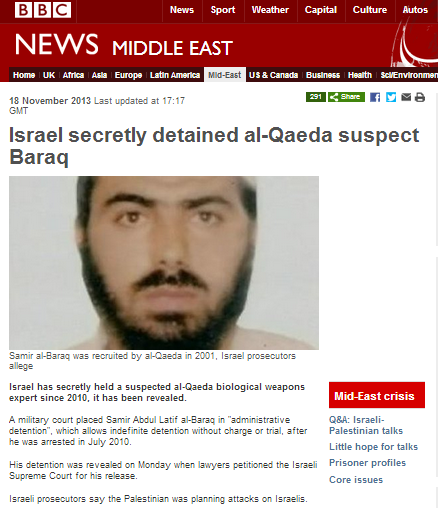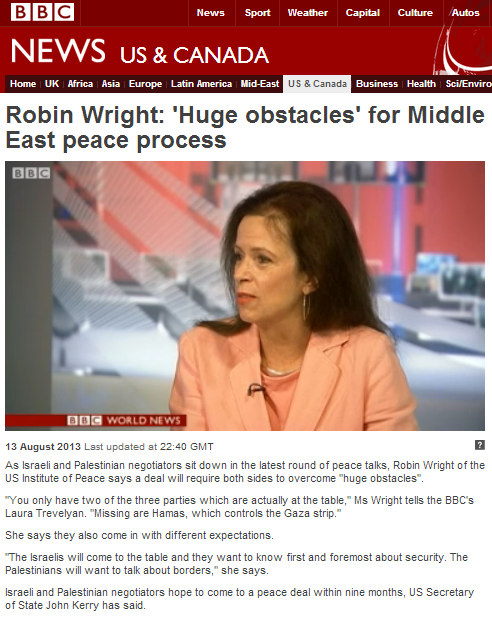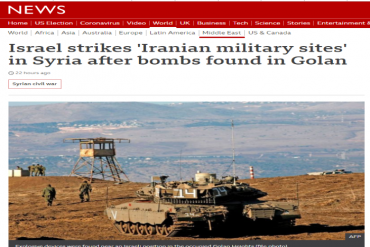On November 18th 2013 the Middle East page of the BBC News website ran an article with the sensational headline “Israel secretly detained al-Qaeda suspect Baraq“.
The report’s opening lines are no less dramatic:
“Israel has secretly held a suspected al-Qaeda biological weapons expert since 2010, it has been revealed.” […]
“His detention was revealed on Monday when lawyers petitioned the Israeli Supreme Court for his release.”
Whilst Samer Abed a-Latif al-Barak’s (also Baraq or Barq) detention may indeed have been a “secret” only recently “revealed” to the BBC, it certainly was not to members of his family who visited him in prison, to the NGOs Addameer (which visited him in June 2012) and Amnesty International (which has been campaigning on his behalf for well over a year) or to the Palestinian Prisoner’s Club which, according to AI, provided him with a lawyer.
Clearly then, the BBC’s implication of some sort of covert, shadowy goings-on is entirely redundant and inaccurate.
The BBC report goes on to give some biographical background on al-Barak:
“According to court documents disclosed on Monday, Mr Baraq was born in Kuwait in 1974 and moved to Pakistan in 1997 to study microbiology.
The following year, he attended a militant training camp in Afghanistan, and in 2001 was recruited by Ayman al-Zawahiri, the current leader of al-Qaeda, the documents say.
He then allegedly acquired “knowledge and experience” in non-conventional weaponry.
Israeli prosecutors said Mr Baraq spent three months at the US military detention camp at Guantanamo Bay in 2003, and was imprisoned in Jordan between 2003 and 2008 for “terrorist activity” and involvement in an al-Qaeda biological weapon project.
He was expelled from Jordan on 11 July 2010 and was subsequently arrested by Israeli troops at the Allenby Bridge border crossing while trying to enter the West Bank.”
In addition to neglecting to point out that al-Barak’s time in Guantanamo Bay was preceded by his arrest in Pakistan by the US authorities due to his Al Qaeda affiliations, the BBC’s account of al-Barak’s activities in Jordan – which resulted in his arrest and imprisonment there – is vague, with the use of scare quotes around the phrase terrorist activity implying that BBC audiences should be sceptical of that description of his activities. The same court documents quoted by the BBC actually include further information:
“According to the report, al-Barq was involved in planning attacks on Jews and Israelis in Jordan and also planned to teach Palestinian terrorists how to manufacture poisons.”
A report from Channel 10 includes some details from al-Barak’s questioning. [translation: BBC Watch]
“Al-Barak was born in Kuwait and in his youth travelled to Pakistan in order to study biology. From there he continued to Afghanistan and there, according to the version he gave to investigators, was trained in biological warfare. “I practiced the manufacture of explosives and poisons, such as cyanide and nerve gas”, he recalled.
During the questioning he told them about an experiment he carried out on a dog, which he put into a crate into which he introduced nerve gas which he had made. “The dog died within minutes”, he recounted coldly. “I discussed with friends the possibility that we would return to the [West] Bank and carry out terror attacks against Israel.”
The terror activist also told of his recruitment to Al Qaeda by the organisation’s leader, Ayman a-Zawahiri. “I met him in Afghanistan and he said I must be in touch with him and learn about anthrax”, he said to the investigators. According to him, a-Zawahiri “spoke of the possibility that a suicide bomber would spread the poison using a sprayer in a public place”.
The BBC’s account also neglects to mention the fact that efforts have been made by Israel to find a country willing to take al-Barak – as noted in a document from the Ministry of Justice.
“It should be noted that several attempts were made to transfer Mr. Al Barq to several Arab countries, however up to date no Arab country has agreed to accept him.”
The remainder of the BBC’s report largely focuses on a partial view of the subject of administrative detention – one which the BBC has often visited before – and includes the quotation of mostly later added figures from B’Tselem.
Thus, BBC audiences are shepherded towards focusing their attentions on specific aspects of the subject of administrative detention (also known as preventative detention in some of the other democratic countries in which it is employed as a counter-terrorism measure or for other reasons – as in the EU) rather than on the issues of public safety presented by a previously imprisoned, Al Qaeda-affiliated, unconventional weapons expert in a region in which Salafist violence has dramatically spiked in recent years.





